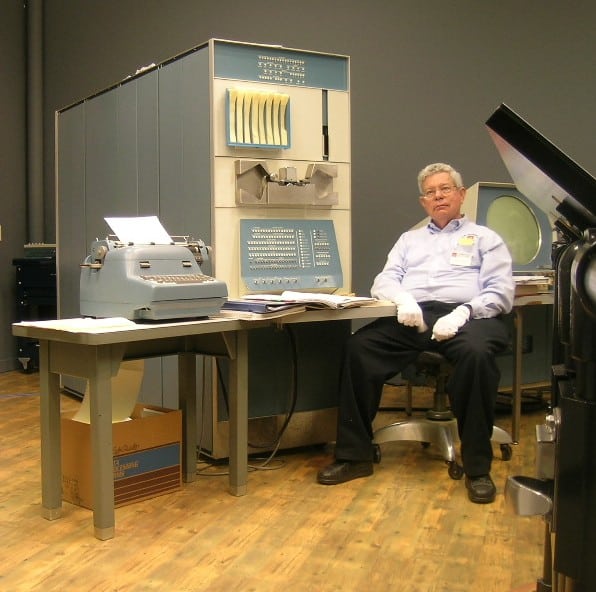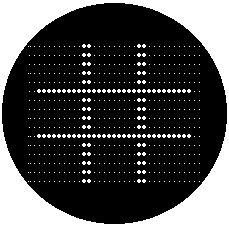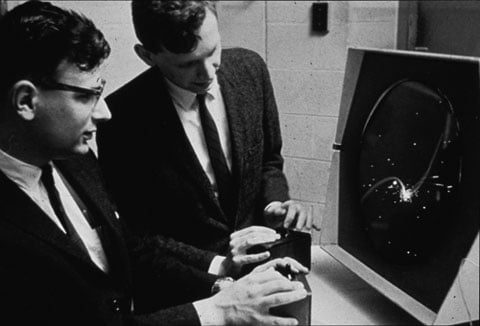Key Points about Spacewar:
- Spacewar is recognized as the first video game with multiple users.
- The first version of Spacewar took about 200 man-hours to write.
- Steve Russell, the inventor of Spacewar, commented, “If I hadn’t done it, someone would’ve done something equally exciting, if not better, in the next six months. I just happened to get there first.”
- The game was created for the interactive DEC PDP-1, which costs about $120,000 in 1962.
- Peter Samson, another inventor, commented, “It was open source because we didn’t have any choice. You couldn’t copyright software in those days.”
- Spacewar often appears as a Trojan horse download on Valve’s Steam.

Steve Russell, the inventor of Spacewar, and the Computer History Museum’s PDP-1 in 2006
©Alex Handy (cropped by Arnold Reinhold), CC BY-SA 2.0, via Wikimedia Commons – Original / License
What Is Spacewar?
Spacewar is a two-player game, with each player taking control of a spaceship and attempting to destroy the other. A massive star in the center of the screen pulls on both ships (called “the needle” and “the wedge”) and requires maneuvering to avoid falling into it. In an emergency, a player can enter hyperspace to return at a random location on the screen, but only at the risk of exploding if it is used too often (there was an increasing probability of the ship exploding with each use).
Russell wrote Spacewar on a PDP-1, an early DEC interactive mini-computer (the first commercial time-sharing computer) that used a cathode-ray tube type display and keyboard input.
Spacewar was not the first computer game ever written (let’s mention only OXO of Alexander Douglas and Tennis for Two of William Higinbotham), but it has an unquestioned place in the dawn of the computer age and the history of computer games. Spacewar was the first to gain widespread recognition, and it is generally recognized as the first of the “shoot-’em’ up” genre.
Spacewar game was started in 1961 by the young computer programmer from MIT Steve “Slug” Russell (born 1937), who was inspired by the writings of the early science fiction author Edward Elmer Smith. It was released on February 14, 1962.
Steve Russell needed about 200 man-hours to write the first version of Spacewar, and he was assisted by his friends from the fictitious “Hingham Institute”: Martin Graetz and Wayne Wiitanen. Additional features were later developed by Dan Edwards and Peter Samson.
The game spread rapidly to other programmers, who began coding their own variants, including features such as space mines, cloaking devices, and even a first-person perspective version, played with two screens, that simulated each pilot’s view out of the cockpit. It became extremely popular and has been widely ported to other computer systems.
How to Play Spacewar
While the original Spacewar game was available for the interactive PDP-1, it can still be played using a PDP-1 emulator in Java or as an online game. The controls vary, but you can typically play the game using the following controls:
- “a”, “s”, “d”, “f” keys to control one spaceship
- “k”, “l”, “;”, “”” keys to control the second spaceship.
Most versions of Spacewar allow the two spaceships to spin in two directions, thrust, and fire. The game itself is simple enough to not require any tutorial or special explanations.
Spacewar has also become popular as a tutorial for learning Python and other coding languages. These tutorial courses walk students through the steps to create a video game by recreating Spacewar or creating an alternate version of the game.
The Difference Between Spacewar vs. OXO
Spacewar may have been one of the earliest video games but it wasn’t the first. The title of the first video game is still debated. OXO is a competitive option, created by A.S. Douglas at the University of Cambridge.
Originally an academic experiment rather than an entertaining pastime, OXO is an electronic Tic-Tac-Toe game that was first created in 1952. While OXO can claim to be older than Spacewar, it wasn’t originally designed for entertainment and wasn’t as popular during its time.

OXO, an electronic Tic-Tac-Toe Computer Game.
©Alexander Douglas, Public domain, via Wikimedia Commons – Original / License
Spacewar Release History
The original programmers went quickly through a few versions of the game before releasing the version known as Spacewar 3.1. This is known as the standard version and was available in low resolution, 512 x 512 pixels, or high resolution, 1024 x 1023 pixels.
Spacewar 2B, 1962
A new version included single-shot torpedoes, exhaust flames from the ships, and modulating brightnesses of the stars. It offered users the option of speeding up the movement of the starfield.
Spacewar 4.1f, 1963
This version offers a distinctive heavy star visual that’s drawn with dashed lines. It makes the heavy star, or sun, easier to distinguish from the ships. The version also features an antipode explosion of two ships if they collide in free fall, while earlier versions had a center explosion. This version was modified from 2005 to 2008 by Peter Samson to create a scorer routine.
Spacewar 4.1a, 1963
This version offers many of the same features of Spacewar 4.1f but wasn’t further modified from 2005 to 2008. It ran using the traditional binary paper tape image.
Spacewar 4.3, 1963
Monty Preaonas created a version with modified gravity computations and an on-screen score display. It offered a twin star mode, which put stars on two corners and pulled the centrally located ship in either direction.
Spacewar 4.8, 1963
This version also included an on-screen scorer. It appears to be the final version of Spacewar that was created in MIT.

Spacewar: End of Development
Spacewar is public domain, so there have been many alterations since the original MIT team published the final version. These unofficial versions add a number of unique features and updated graphics. Spacewar never truly ended development, though the original team finished releasing updates in 1963. The name also lives on in Steam as a common name for Trojan horse downloads of pirated computer games.